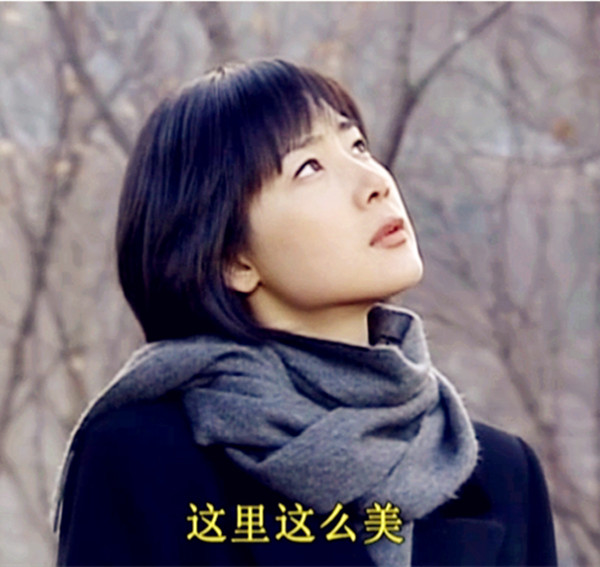Love Song in Winter: Remember the surging Korean Wave?
Editor’s note: This is a nostalgic theater.
Since the late 1990s, Korean pop songs and film and television works have swept across the country. At that time, China media vividly named this phenomenon "Korean Wave". In fact, this unique noun also contains many derogatory meanings. Many people regard it as a cultural invasion of South Korea, and the voice of "boycott" is endless. When it comes to the "culprit", this Winter Love Song is absolutely indispensable.
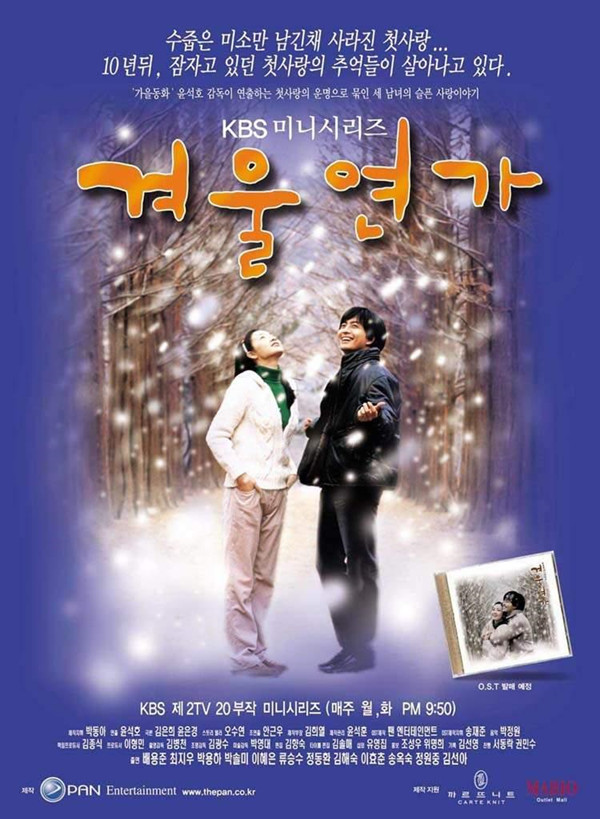
BYJ, a different teacher-nurse killer.
Speaking of "Winter Love Song" broadcast in 2002, apart from the extremely beautiful snow scene, the actor BAE Yong-joon is undoubtedly the most impressive to the audience. Unlike today’s situation where fans have their own good hearts, he almost achieved a kill. The title of "teacher’s milk killer" is by no means a hollow reputation.
How popular is BYJ in Asia? Japanese Prime Minister Shinzo Abe’s wife, Akie Abe, is a standard Korean drama fan. According to media reports, her favorite Korean drama is Love Song in Winter, which is also the ashes of the leading actor Bae Yong-joon. The Japanese drama "The Battle of Marriage Proposal" (2007) once described the popularity of BYJ in Japan that year. In the Japanese drama "The Companion of Justice" (2008), whenever the protagonist fantasizes about love, the soundtrack of "Winter Love Song" will be played. In the Thai film Hello Stranger (2010), the heroine ran to take a photo with the statue of Bae Yong Jun. It is no exaggeration to say that in that year, Bae Yong-joon alone brought a wave of wearing glasses, tying scarves, dyeing men’s hair and traveling in South Korea throughout Asia.
To be fair, Bae Yong-joon is not a "handsome man" in the traditional sense. Regarding his face value, it is purely a matter of different opinions. But he has his own unique flavor, which boils down to maturity, warmth and affection. Different from today’s small fresh meat, Li Minheng played by Bae Yong-jun is not a "overbearing president" or a "rich young master". Bae Yong-jun’s performance style makes the audience feel more cordial and comfortable. From the shape of a scarf with glasses to a faint smile (not a crazy and cool evil smile), he always leaves a reliable and reliable image.
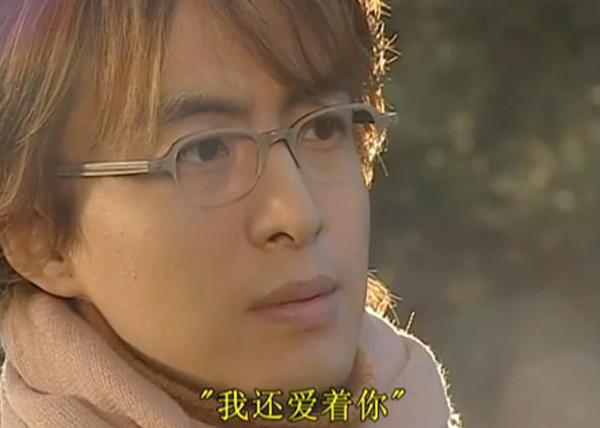
Bae Yong-joon became affectionate, which killed the female audience. The general routine of love idol drama is the complicated relationship between the characters and the multi-angle love situation caused by them. In short, the more you cut it, the more chaotic it is. The more chaotic the scene, the greater the drama tension. But "Love Song in Winter" doesn’t follow the usual path, whether it’s Bae Yong-joon or Cui Zhiyou, they only have each other in their hearts and are faithful. The swing and entanglement that are common in idol dramas do not exist in this drama. If the hero doesn’t like the second girl, he will definitely break up with her and never drag his feet. Every step he takes is for the sake of the hostess.
Remember that Polaris necklace in the play? The hero played by Bae Yong-jun expressed his affection to the heroine with it. "All the other stars have changed their positions, and the Polaris will still be in the same place. When others don’t understand you, don’t forgive you, or even leave you, as long as I stay in the same place, you won’t get lost." Hearing this, coupled with BAE Yong-jun’s affectionate eyes, the female audience at that time could not stand it. At the end of the play, the man kept his promise and finally built a house for his beloved, and waited silently. I would like to ask, who doesn’t want to get such a warm home all over the world?
In retrospect, Doumyouji Tsukasa, played by Jerry Yan, was a rebellious and naive big boy in the same period’s popular idol drama Meteor Garden. In this way, it is not surprising that BYJ can win the hearts of female fans of a wider age.
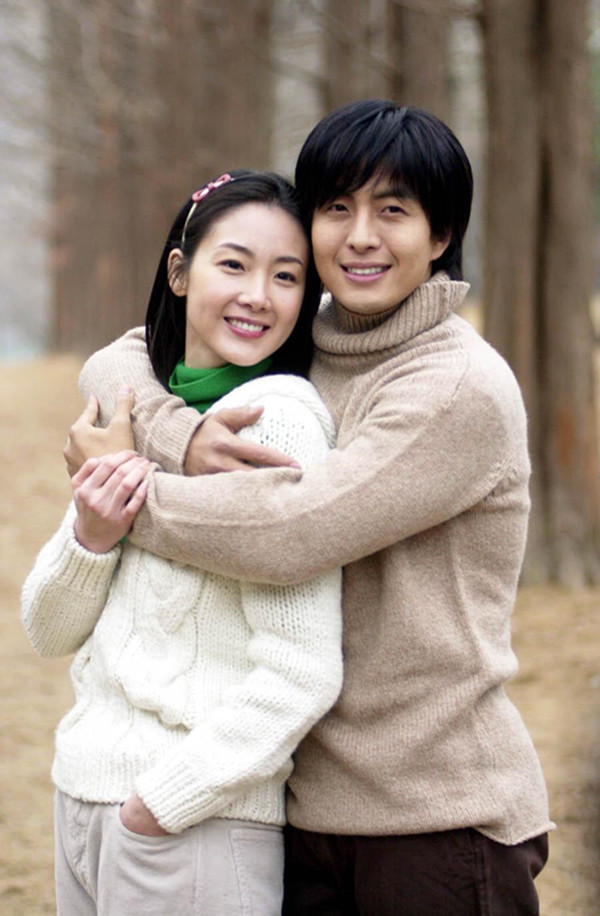
Cui Zhiyou and Bae Yong-jun, the protagonists of Winter Love Song.
The Origin of Three Treasures in Korean Drama
Anyone who is a fan of Korean drama will know the "three treasures" of Korean drama: terminal illness, car accident and amnesia. I really don’t want to say that "Winter Love Song" has put them all together.
Only a few episodes after the opening, the hero Jiang Junshang suffered a car accident, which made Wei Zhen mistakenly think that he was dead, which directly caused their first separation. What is more tragic is that the hapless man has lost his memory. This is one of the dog blood reversals. However, if it weren’t for this, there wouldn’t be so many stories to tell when they met many years later.
Just as everything is developing in a good direction, seeing that lovers are about to get married, Jun Shang found a venous hematoma in his head and lost his sight. In order not to drag Wei Zhen down, Jun Shang is determined to let her go to study abroad and finish her unfinished dream while she is still visible — — Draw a sketch of the ideal house. This is the second reversal of dog blood.
Of course, the reversal of the most dog blood is still beyond the three treasures, that is, the life experience of the man. Jiang Junshang first mistakenly thought that he and Weizhen were brother and sister, which almost completely ruined love and made the audience in front of the TV fall into despair. After a long time, he finally found that he and his male rival are brothers. Seriously, the emotional entanglements of the parents of these protagonists are enough to make another Korean drama. All in all, a "Winter Love Song" has almost all the elements of dog blood that we can think of, and now it is really emotional to recall.
But at that time, most of the audience did not give up the play because of the above exaggerated settings. On the contrary, everyone still watched it with relish. Why is this? Probably because the feelings between the hero and heroine are too sincere and touching. To this day, Bae Yong-joon and Cui Zhiyou are still the best Korean drama screen lovers. It seems that nothing can stop this pair of bad karma Yuanyang except unpredictable external factors, which finally makes all kinds of stalks that the screenwriter has pondered over come into play.
The most crucial point is that no one expected that these dog blood settings would become the routine operation of Korean dramas in the future. The so-called extremes meet, too much and too much use will naturally make the audience disgusted, but this may not be the fault of the three treasures of Korean drama.
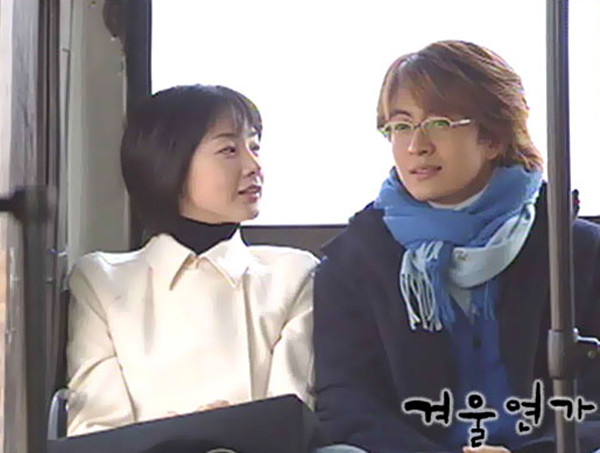
The Impact and Decline of Korean Drama Culture
Jealousy in 1993 was probably the first Korean drama to appear on China’s screen in history, but it didn’t arouse much response. In 1997, What is Love was broadcast on CCTV, which also left a deep impression on a generation of China audiences. Later, dramas such as look for a star, Life and Death in Blue, Stairs to the Kingdom of Heaven, Romance Full House and Dae Jang Geum came one after another, which, like Ode in Winter, became a generation of classics.
Why can Korean dramas once be popular and even become a cultural phenomenon? You know, in terms of aestheticism and bitterness, our aunt Qiong Yao is also too generous. The success of Korean dramas is the first time for Chinese people to see the strength and rigor of the TV drama industry assembly line. In 1998, the Ministry of Culture and Tourism of Korea set up the Cultural Industry Bureau to manage and support the domestic cultural industries such as TV and movies, paving the way for the industrialization of Korean dramas. At the end of May 2012, the "Korean Wave Export Impact Analysis and Financial Support Program" published by the Overseas Economic Research Institute of the Export-Import Bank of Korea showed that every $100 increase in the export of Korean cultural industries would increase the export of Korean goods by $412. It can be seen that South Korea once really regarded the production of Korean dramas as a major cause of cultural output.
As the export object of Korean dramas, China audiences have a good impression on them. As "Love Song in Winter" shows, there are not only love that conforms to East Asian culture and aesthetics, but also fashion elements that domestic TV series did not have at that time. The shapes and costumes of Bae Yong-joon and Cui Zhiyou were once imitated by young people. The theme song sung by Yong-ha Park always rings at the right moment, and it is also covered by Jeff Chang Shin-Che. Needless to say, "Love Song in Winter" tries its best to show the beautiful and prosperous side of Korean cities. The above factors are superimposed together, creating a beautiful dream for China audience, especially urban men and women.
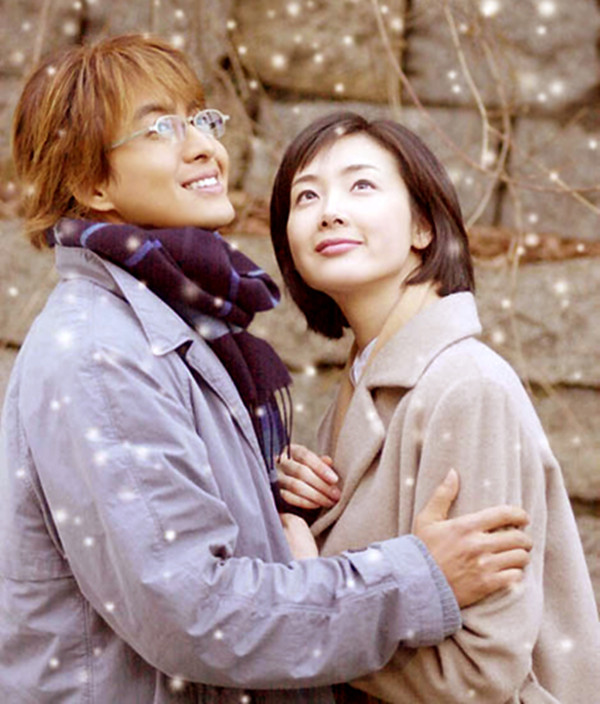
But as long as it is a dream, it will wake up after all. With the broadening of China audience’s horizons and more diverse choices, the popularity of Korean dramas has faded unconsciously. This may also have something to do with the defects of Korean dramas themselves. In fact, in addition to the three treasures that people often spit out, the procrastination and verbosity of Korean dramas themselves have always been criticized. The length of the 26 episodes of Winter Love Song is not long, but there are still many paragraphs that make people feel sleepy. In the last few episodes, Cui Zhiyou’s teary-eyed close-up appeared repeatedly for N times. Even if the audience knows how to cherish the fragrance and cherish the jade, it will inevitably lead to aesthetic fatigue.
On the morning of June 30th, 2010, Yong-ha Park, the male No.2 in Winter Love Song, was found by his mother to commit suicide in his room, at the age of 33. His passing seems to indicate that the Korean Wave that once swept through China is gone forever. And first hero’s Bae Yong-joon, also aware of the truth, gradually faded out of the film industry and transformed into a producer and the boss of a listed company. Kim Soo Hyun, the favorite "Professor Du" of China fans, was cultivated by him. Love Song in Winter is gradually buried in the memory of China audience.
Nowadays, Korean dramas have basically abandoned the route of simple bitterness, and the theme is broader. There are romantic love works such as You from the Stars, Descendants of the Sun and Ghosts, as well as the series Please Answer about the lives of ordinary people, The Secret Forest, which reflects the power struggle, Live, which depicts the daily life of the police, and the black comedy City in the Sky, all of which are excellent works in Korean dramas in recent years. "Mourning" and "Diablo" have unconsciously become the new labels of Korean dramas. Looking back, those "Winter Love Songs" were really "silly and naive".
But just like everyone’s youth, the purity and truth in Winter Love Song may be the most memorable.
